Review: Arcadian Atlas
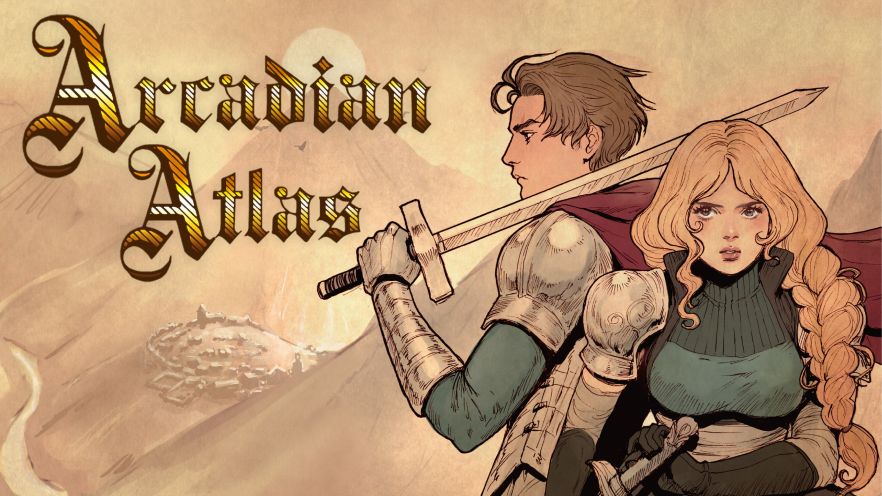
If you’ve been reading my reviews for the past several years, you have probably been able to figure out certain things about me, and one of those things is that I am still pining for a sequel to Final Fantasy Tactics. The two that we technically got were both worse in terms of writing, mechanics, and gameplay in every way; neither one of them came close to scratching the itch. No, we are still waiting on a proper sequel… and the people who truly loved the original, an all-time classic, include a number of people who are still active in the indie game development scene.
Arcadian Atlas is so clearly and so unapologetically trying to be Final Fantasy Tactics 2 that I almost feel like it would be better if the game just popped that up in the intro.
This is not to say the game totally lacks any of its own identity or anything like that; rather, it’s to say that if you’ve played Final Fantasy Tactics the parallels will be so desperately clear that not saying it outright feels like a game of jinx. But with its launch price of $25, is it a worthy inheritor to the throne? A pretender, unable to live up to its obvious inspiration? Well, let’s figure that out.
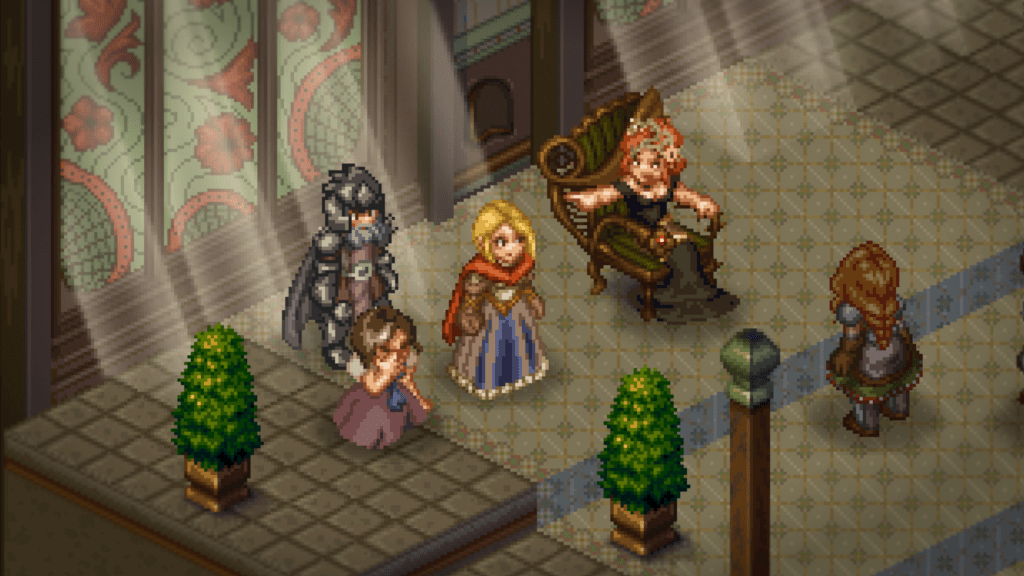
Blame Yourself or God
For those of you who think that maybe I’m being harsh on the game with the above comparison, please consider the following: The game starts with a tutorial battle in which you only have control over a couple of characters in the midst of a larger conflict, ending with a crucial event in which it’s clear once-close people have been separated. We then are immediately flashed back to the before times, a more innocent time, where an aging monarch is on his deathbed and yep, this is all familiar setup.
In broad strokes, Queen Venezia is presiding over the realm with King Tirgan ill. The king’s eldest daughter, Lucretia, is convinced that Venezia is poisoning her father and is conspiring to take control of the kingdom for herself. Venezia, meanwhile, is distrustful of Lucretia as someone who seeks to depose her and claim the throne even as her own mother had been executed as a traitor. Vashti and Desmond, two knights of the kingdom, start under the service of the queen pursuing Lucretia after she failed to prove Venezia was behind a scheme.
What follows is… well, exactly what you might expect. Oh, yes, there’s a civil war about to come to a head between Lucretia and Benezia, but there are also rumors of dark magic being investigated by a mysterious rogue and Lucretia’s younger sister, Annelise, falling into that same circle. Vashti and Desmond have their own allegiances and aspects that they spin off into and, as you might expect, everything gets really complicated and helped not one whit by the fact that basically every interaction with other people is at the point of a sword.
It isn’t perfect in this regard, of course. I found it hard to really care much about Desmond on a whole, which is kind of a problem when one of the premises behind the game is that you’re supposed to root for Vashti and Desmond to make it through this conflict together and with their basic humanity intact. But the broad strokes of the plot and the character interactions work. You get the sense of being smaller people swept up in the wake of bigger people with bigger goals, and it’s hard not to find yourself following along with the plot and wondering what twist is coming next. If it errs on the side of making the protagonists a little more arch, well, that’s not something its obvious inspiration can be claimed to have avoided either.
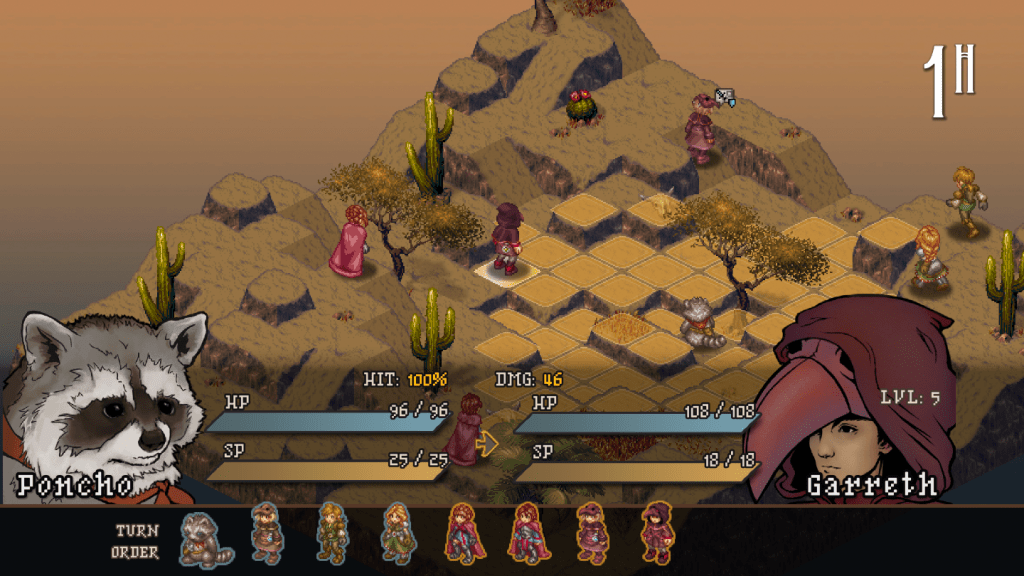
Surrender or Die in Obscurity!
So the combat system is Final Fantasy Tactics. Done. Can I move on? No, no, I suppose that sounds rude even if it is basically accurate. Battles take place on maps with isometric display and a number of environmental aspects, characters move around, no, really, it’s very FFT in its feel and balancing without adding in the zodiac system. Really, it’s easier to just start by explaining where the game differs because that’s just more interesting.
First of all, the game does away with any mechanisms for leveling in battles. If a character participates in a battle, they gain a level at the end (assuming they don’t die, of course). Your major story characters keep up with the leveling all through the game, too, so you can’t ever lose out by not including them in a given fight. This is, ultimately, a reasonable compromise; it avoids infinite experience loops that break the game, while also preventing you from wildly overleveling everything to victory. Victory goes primarily to whoever has better managed their stats and character builds.
Unfortunately, the game also does away with the plethora of jobs in FFT and replaces them with… twelve. Twelve classes. Specifically, four basic classes (Cavalier, Warmancer, Apothecary, and Ranger) and two advanced classes for each basic one. But these are not provided to you simply on a grid. A Warmancer is a Warmancer until they promote into one of the advanced classes, and then they are that advanced class. You can respec your named story characters if you so desire, so that’s nice, but everyone else is on a fixed path – and even your story characters are on that same fixed path, you just get to choose which fixed path.
This is ameliorated somewhat by the fact that each class has a variety of different skills to unlock, and while you retain the skills you unlocked when you promote, you can’t go back and unlock more of them. There is an ability to build and enhance individual characters, and to an extent it does make sense; it’s not like a Knight with Black Magic made much sense in FFT. But it does mean that the game is far more constrained than its obvious inspiration, a more targeted experience. You cannot wind up starved for JP or struggling to manage complex promotion trees, but in exchange you can’t choose to pair disparate skills with one another. Swings and roundabouts, if you will.
Last but not least, everything costs SP. There are no “free” skills; you spend SP for every action, from melee attacks to spells to buffs to healing. This is not a major change or problem, but it does help somewhat change how overpowered non-casters were in FFT (since many abilities that other jobs could learn cost no MP and came out faster). All of the classes do feel like they have a niche and a function. It is perhaps not as sprawling, but it isn’t boring.
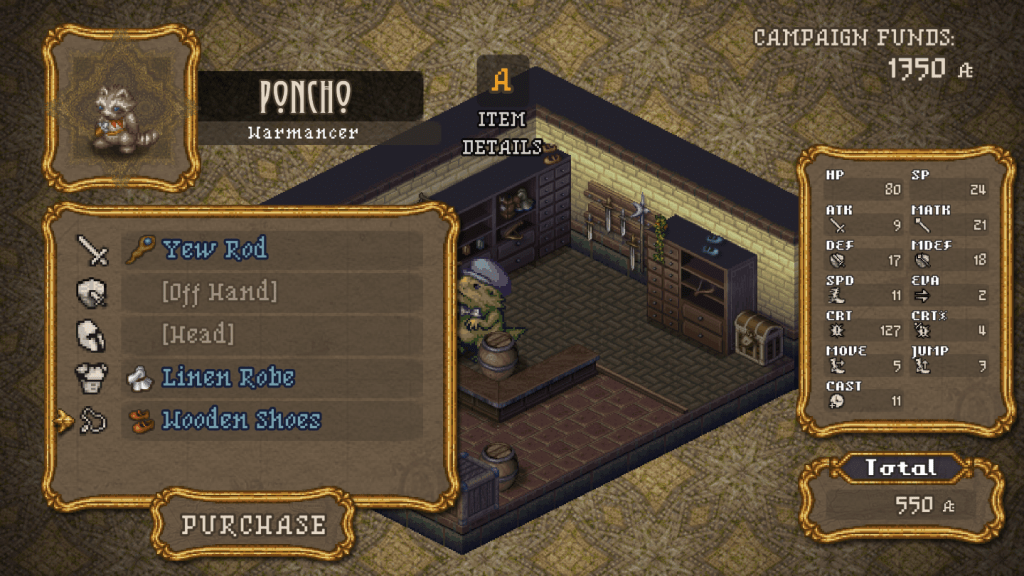
Reality is Far Harsher than You Can Possibly Imagine!
The pixel work on the sprites in the game is… look, I am as tired of typing FFT as you are of reading it, but look at it. The influence is clear. But the influence also led to these sprites being gorgeous to look at, detailed and colorful and beautifully animated. Battlefields are marvelously detailed, although I couldn’t find a command for rotating the battlefield and don’t believe there is one. (This is a minor problem and why FFT let you do that for some complicated navigation, but it is something you can deal with.)
Character portraits, menus, status symbols, and the like are also excellent and clear. I think it’s a minor insight to keep status ailments lower and buffs higher, letting you know at a glance “is what’s happening to my guys good or bad.” Character portraits are also gorgeous, but they do… well, I don’t want to say clash with the sprite style, but because everything else has such a clear inspiration you wind up feeling like they stand out a bit. Like, they’re the biggest thing that doesn’t match the FFT aesthetic.
In audio terms… I find myself conflicted. Not because the music is bad, because it is decidedly not; it’s clean, catchy, and I find myself still humming some pieces. This is a good soundtrack. The problem is that its very jazzy feel does feel at odds with the game itself. On the one hand, there’s no law saying that a fantasy game has to have a soundtrack that sounds a certain way, and again, this is a really good soundtrack. On the other hand, it feels like it’s a jazz-and-swing soundtrack placed into the game not because of some thematic reason but the composer… just felt like doing that.
No idea why this in particular stood out to me so resolutely, but it does. Your mileage may vary, but once more I wish to stress that the game sounds good. I like it. It’s not a mark against the game, it’s just an oddly incongruous sound to me. Heck, maybe that’s just a me problem.
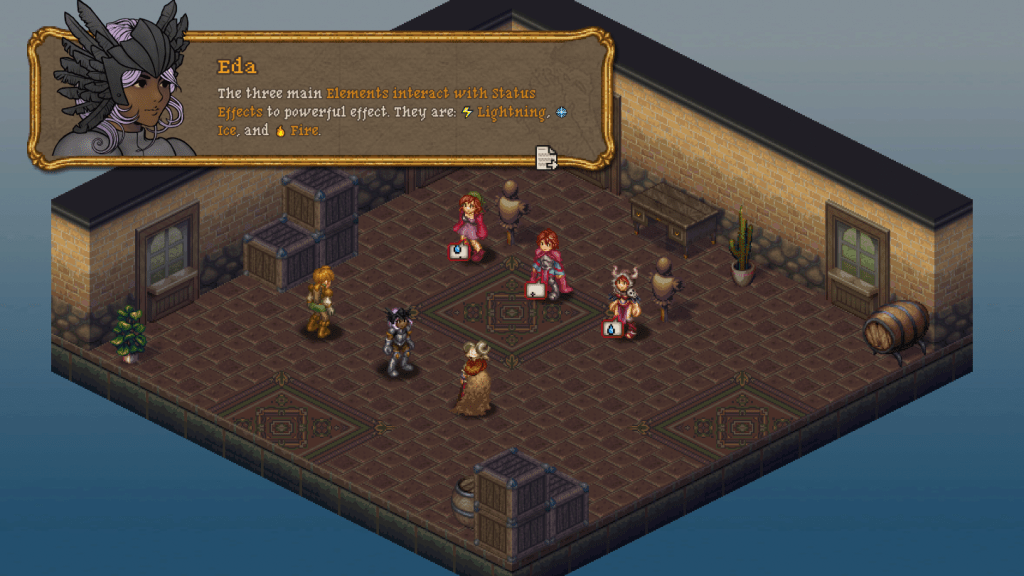
Ramza…What Did You Get?
So… yeah, I’ve kept comparing this game to Final Fantasy Tactics throughout the review. I really hope the developers aren’t reading this and getting upset about that, but… I mean… this is the game you made, folks, and I see the notes you are cribbing from. And I’m sorry, but this game is not as good as Final Fantasy Tactics.
But that’s the thing – when you aim really high at an all time classic, it’s very possible to be not as good as that classic but still be really good. And yeah, in that capacity? Arcadian Atlas is really flipping good.
It’s smaller than its inspiration, a bit simpler in some ways, and I am very deliberately leaving out some of the places it goes simply on the basis that it’s worth seeing it for yourself. If you’re like me and have been looking for more FFT for the past two decades, this game will not sate your hunger completely, but it’ll be damn filling. You will walk away satisfied. That is high praise, and a testament to how good the game actually is.
And I’m itching to play it again… and hopeful for an even better sequel one day, perhaps. So give this one a shot.
~ Final Score: 8/10 ~
Review copy provided by Serenity Forge for PC. All screenshots courtesy of Serenity Forge.

You must be logged in to post a comment.